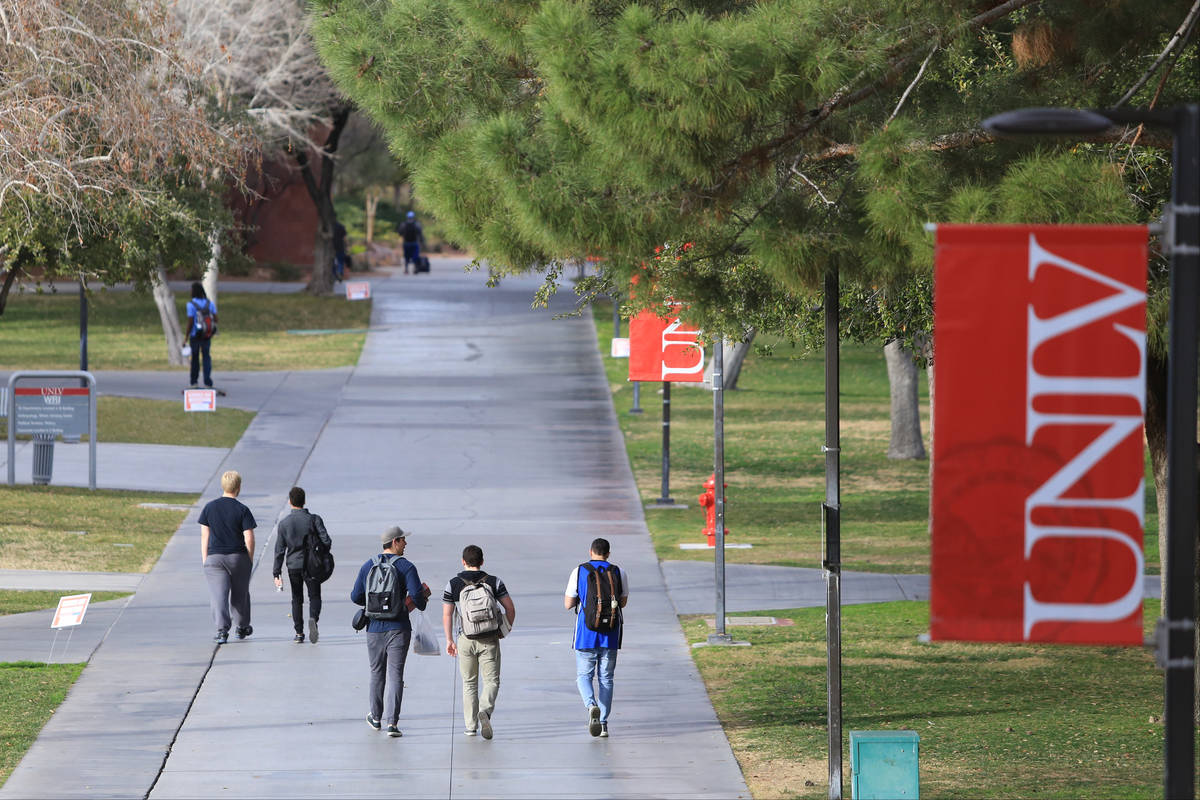UNLV to award $11.8M in federal COVID-19 relief money to students
Starting this week, UNLV is distributing $11.8 million in federal coronavirus relief money to students.
UNLV — among other colleges and universities nationwide — was awarded the funding through the CARES Act.
In a Tuesday letter to students and employees, Juanita Fain, UNLV’s vice president for student affairs, outlined the university’s process for distributing the money.
UNLV is awarding the first round of grants — expected to total about $8.3 million — to students automatically based on financial need, determined using Free Application for Federal Student Aid (FAFSA) information. Grants are either $500 or $1,000.
“We’re delighted to be able to provide this relief to students,” UNLV’s interim Provost Chris Heavey said Wednesday. “We recognize the level for these awards will often be short of what’s needed to help people during this crisis.”
Nearly 12,500 students have received notification of being offered an automatic grant, he said. Students are then required to confirm they’re financially affected by the COVID-19 outbreak.
As of Wednesday, about 7,500 students have accepted the awards, Heavey said, noting that students could receive the money as early as Thursday via direct deposit or check. Money won’t be applied to pay off any balance a student may owe to UNLV, he added.
Students who don’t receive automatic aid will have until May 15 to request assistance, Fain wrote in the letter. A request form will be available on or before May 6, and information will be sent to students via a campuswide email.
“Factors such as job loss, child care or medical expenses, housing or food insecurity, an inability to pay for educational supplies, technology or expenses will be considered,” Fain wrote.
A small panel — which Heavey said will probably include student representation — will review second-round requests. The goal is to have money distributed by mid-May, he said.
Because of federal requirements, some groups of students — including Deferred Action for Childhood Arrivals (DACA) recipients or those enrolled only in online classes — aren’t eligible for a relief grant. Nevada System of Higher Education held a virtual town hall meeting Tuesday that focused on DACA.
At UNLV, “we’re trying to come up with other ways to support those students,” Heavey said.
College of Southern Nevada received about $7 million in federal student aid money but doesn’t have a plan yet for how it will be distributed.
“We are still working on our plans for the disbursement of (CARES) Act funds to eligible students and we hope to have that plan finalized in the coming days,” spokesman Richard Lake said in a Wednesday email to the Review-Journal.
Nevada State College received about $1.4 million. It plans to award $500 grants, some of which will be distributed automatically based on factors such as a student’s “expected family contribution” on the FAFSA, according to an April 23 memo from the provost’s office.
There’s an online application for students who don’t meet the automatic qualification requirements but need assistance.
President Donald Trump signed the CARES Act into law in late March. It includes nearly $14 billion for colleges and universities. On April 9, U.S. Secretary of Education Betsy DeVos announced the availability of $6.2 billion to award emergency grants to students.
NSHE will receive nearly $60 million through the CARES Act. Half of that — about $30 million — was distributed to schools for student aid, according to April 10 Board of Regents meeting materials. The other half — which is for “institutional support” — will go toward budget reductions for the 2020-21 fiscal year.
Contact Julie Wootton-Greener at jgreener@reviewjournal.com or 702-387-2921. Follow @julieswootton on Twitter.
By the numbers
Here's the approximate amount of money that Nevada's public colleges and universities are expected to receive in student aid through the federal CARES Act:
UNLV: $11.8 million
University of Nevada, Reno: $7.1 million
College of Southern Nevada: $7 million
Truckee Meadows Community College (Reno): $1.7 million
Nevada State College (Henderson): $1.4 million
Western Nevada College (Carson City): $681,735
Great Basin College (Elko): $235,030
Source: Nevada System of Higher Education

















